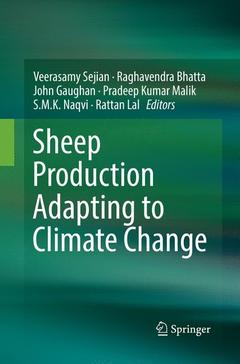Description
Sheep Production Adapting to Climate Change, Softcover reprint of the original 1st ed. 2017
Coordinators: Sejian Veerasamy, Bhatta Raghavendra, Gaughan John, Malik Pradeep Kumar, Naqvi S.M.K, Lal Rattan
Language: English
Subjects for Sheep Production Adapting to Climate Change:
Publication date: 12-2018
Support: Print on demand
Publication date: 07-2017
Support: Print on demand
Description
/li>Contents
/li>Biography
/li>Comment
/li>
This book presents a compilation of the latest findings from reputed researchers around the globe, covering in detail climate change and its effects on sheep production. In the current global climate change scenario, information related to its impact on livestock agriculture is lacking.
The negative impacts of climate change are already being felt by all livestock species. Further, the mitigation and amelioration strategies that are applicable for one species may not hold true for another. As such, concerted research efforts are needed to identify species-specific strategies for mitigation and adaptation.
With that goal in mind, this book is the first of its kind to gather comprehensive information pertaining to the impact of climate change on various aspects of sheep production. It also sheds light on the role of sheep with regard to the global greenhouse gas pool. The book highlights the status quo of sheep production from climate change perspectives and projects the significance of adapting future sheep production to the challenges posed by climate change.
It addresses in detail the various adaptations, methane mitigation and amelioration strategies needed to sustain sheep production in the future. In addition, the book presents development plans and policies that will allow the sheep industry to cope with current climate changes and strategies that will lessen future impacts.
Bringing together essential information prepared by world-class researchers hailing from different agro-ecological zones, this book offers a unique resource for all researchers, teachers and students associated with sustaining the sheep production in the face of global change.
Dr Veerasamy Sejian, PhD.,is Senior Scientist at ICAR-National Institute of Animal Nutrition and Physiology (NIANP), Bangalore, India. Dr Sejian is the team leader which established the concept of “Multiple stresses impacting small ruminant production in the changing climate scenario”. His current research is focused on developing agro-ecological zone specific thermo-tolerant breed. Dr Sejian has published 57 international and 19 national peer reviewed research articles, 62 book chapters, 130 invited/lead papers and 86 conference papers. Further, Dr Sejian has published two international Springer books. Recently, Dr Sejian was bestowed with Endeavour Research Fellowship by the Australian Government. Further, ICAR has bestowed him with the prestigious Lal Bahadur Shastri Outstanding Young Scientist Award.
Dr Raghavendra Bhatta, PhD., is the Director at the ICAR-National Institute of Animal Nutrition and Physiology (NIANP), Bangalore, India. Dr Bhatta and his team for the first time have developed the all India district wise inventory on enteric methane emission. Dr Bhatta has published 63 research papers in journals of high impact factor, 25 book chapters and 83 conference papers. He also edited a book on Livestock production and climate change published by CABI. He was the recipient of prestigious JSPS Post-doctorate Fellowship at NILGS, Japan. He has been recognized as an expert of the Technical Advisory Group (TAG) of the Food and Agricultural Organization of the United Nations (FAO).
Dr John Gaughan,PhD., is an Associate Professor in the School of Agriculture and Food Sciences at The University of Queensland, Gatton, Australia. He has authored or co-authored 11 book chapters, 34 refereed publications, 72 conference proceedings, and 20 research reports. He is recognized as a leader in cattle heat stress research in Australia and internationally. He is part of an international team which has rece
The first species specific book for studying climate change impact
Identifies strategies to mitigate climate change impact on sheep
Contributions from established sheep researchers around the world
These books may interest you

Advances in Sheep Welfare 253.24 €



